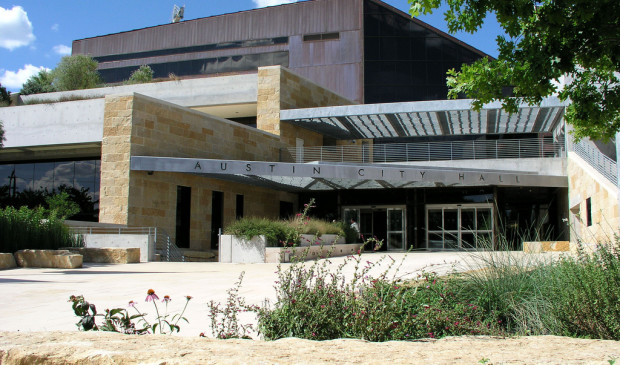Land-use pros respond to lobby proposal
Thursday, November 5, 2015 by
Jo Clifton If City Council eventually approves an ordinance based on Council Member Leslie Pool’s resolution to revise the city’s lobby registration laws, the result could be a Planning Commission with no architects, engineers or other land-use professionals, according to a group of those professionals representing 11 different organizations. A separate city ordinance prohibits any registered lobbyist from serving on a city board or commission.
That same group says that in addition, the whole process through which the city permits and oversees land-use regulations would become even more complicated than it is now.
These are two of the biggest concerns of the group, which is led by architect Stuart Sampley, who sent a letter to Council on Wednesday dissecting, criticizing and offering some alternative language for lobby law reform.
The land-use professionals propose language for the ordinance that would make it clear that the term “municipal question” does not include the “day-to-day application, administration, and execution of city programs, policies and procedures such as permitting, platting, plan approval, and technical matters related to or in connection with a specific project or development.”
One of the proposals in the Pool resolution is to eliminate incidental employment as a lobbyist as an exception to the definition of “compensation” and “expenditures” for lobbying. The ordinance currently says that “compensation paid to an individual regularly employed by a person” would not count as a lobbying payment if that money is ordinarily paid to the individual for other activities, and that “lobbying activities are an incidental part of the individual’s regular responsibilities” to the person making the payment.
A letter sent to the mayor and Council yesterday says, “All large Texas cities, including, Dallas, Houston, San Antonio, Corpus Christi, Laredo and El Paso, and the State, limit the lobbying registration and reporting requirements through a combination of threshold applicability requirements, a limited definition of lobbying and lobbying activities, and explicit exclusions of the day-to-day communications necessary for the plan approvals. … (N)ot only does the proposed resolution not contain any such limitations, it also wholly misrepresents the substance of other municipal ordinances and falsely implies that the suggested changes are supported by the language of those ordinances.”
The proposal, which was largely written by attorney Fred Lewis for Pool, does not serve “the intended purpose of promoting Austinites’ ability to monitor lobbying activities or improve the City of Austin’s ability to enforce a lobbying ordinance,” the group says in its letter. However, “it would require thousands of professionals to register and report their day-to-day communications with city staff,” they say.
Attorney Casey Dobson, who helped the group draft its letter, told the Austin Monitor, “I think the reason that you see this day-to-day communication exception from the definition of lobbying in all these other cities is so that the necessary day-to-day interaction between design and engineering professionals and city staff isn’t paralyzed or thrown into a negative light by defining something that’s not lobbying as lobbying.”
The group proposes that a person who spends fewer than 26 hours engaging in lobbying, including preparation, during a three-month period “for which the person is compensated or reimbursed” would not be required to register as a lobbyist. There could be a considerable argument about this point, which might include the question of how the city or the public would gauge the amount of time a person spent on such activities. However, the 26-hour exception comes directly from state law.
Sampley, who is the president of the Austin chapter of the American Institute of Architects, said Wednesday, “Not only does (the proposal) affect someone who is a principal or owner of a firm, it affects all of their employees because all of their employees are creating preparatory documents for submittal. And that’s a big deal. Even if they’re not even going to a Council member’s office or talking about it with an appointed official, if they created or prepared a document and they’re on the project team, they’re considered lobbyists at that point. It’s just so broad.”
Lewis has argued that engineers, architects and others who work with city staff and are not lobbying would not have to register under the proposed ordinance. He said unlike current city law, the proposal “has clear exceptions from lobbying for submitting required city documents, providing information, responding to requests from the city, for testifying in public, seeking to achieve compliance with city law, and other circumstances.”
Those signing the letter include representatives of the American Institute of Architects Austin, the Texas Society of Professional Engineers, the Austin chapter of Associated General Contractors, the Austin branch of the American Society of Civil Engineers, the Home Builders Association of Greater Austin, the American Society of Landscape Architects, the Real Estate Council of Austin, the Structural Engineers Association of Texas, the American Council of Engineering Companies of Texas and the Greater Austin Contractors & Engineers Association.
Sampley is scheduled to meet with Pool, Lewis and Jack Gullahorn, a well-known state lobbyist, to discuss the matter this morning.
Photo by Austin’s Only Paper made available through a Creative Commons License
You're a community leader
And we’re honored you look to us for serious, in-depth news. You know a strong community needs local and dedicated watchdog reporting. We’re here for you and that won’t change. Now will you take the powerful next step and support our nonprofit news organization?









